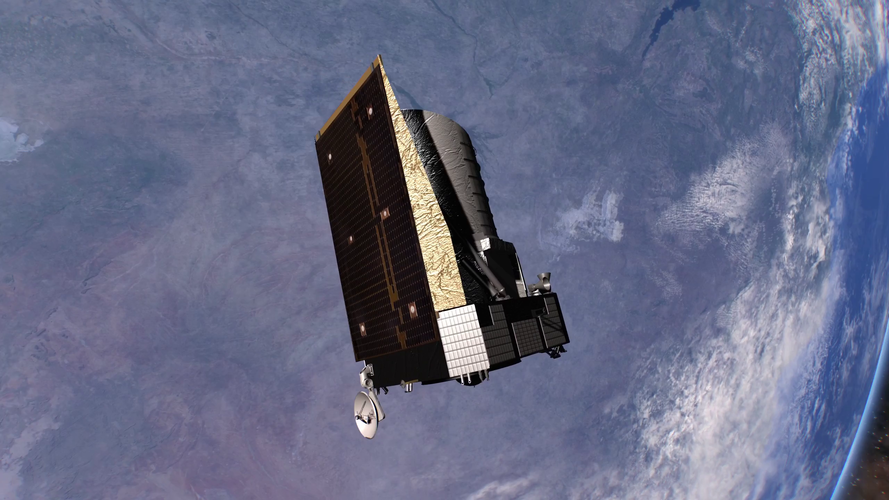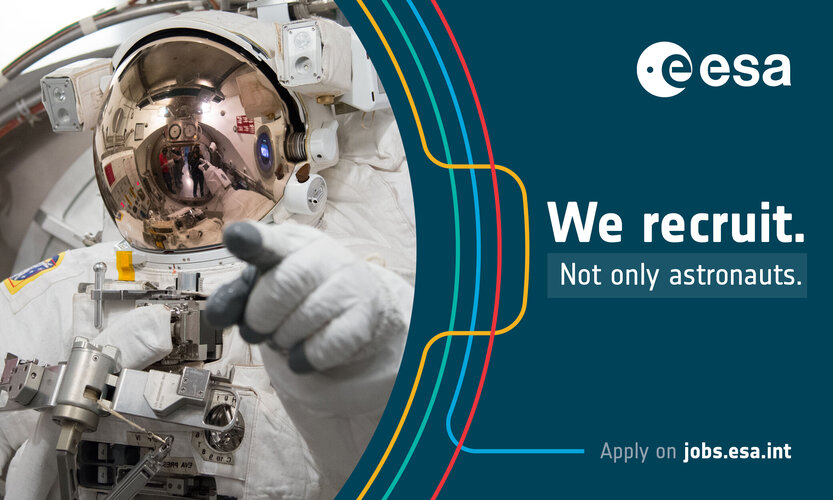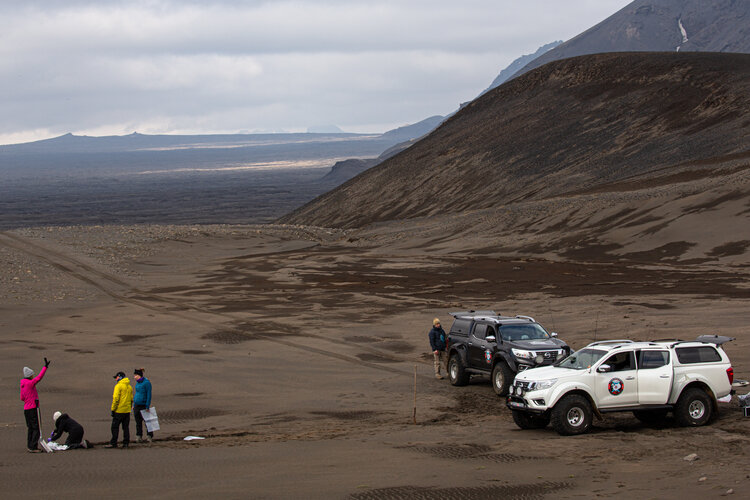
Copernical Team
Euclid’s large halo around indefinitely small point

Space awaits you! More ESA vacancies now open for applications

In March, we announced that 2023 would see the publication of over 300 vacancies at ESA. New vacancies keep being published as we continue our search for talented and motivated professionals to join our teams across Europe and support our mission of the peaceful exploration of space for the benefit of everyone. Could ESA be the next step in your career? Read more to find out!
Martian treasure hunt in Iceland
 Image:
Image:
A team of martian scientists scouts the foothills of a volcano in Iceland hunting for a particular type of soil that matches samples collected by NASA’s Perseverance rover on the Red Planet.
The majestic landscape has a rusty colour from the dark, dense rock ejected during volcanic eruptions. The volcanic terrain, cool temperatures and sparse vegetation make the area very similar to ancient Mars. These conditions helped Iceland become the first European stopover for a treasure hunt that is searching for Mars-like samples around the world.
The effort is part of the joint Mars Sample Return
OceanMind selects Spire Global's satellite ship-tracking data to combat illegal fishing
 Spire Global, Inc. (NYSE: SPIR) ("Spire" or "the Company"), a global provider of space-based data, analytics and space services, was selected by OceanMind, a leader in marine enforcement and compliance, to extend its agreement in providing real-time automatic identification system (AIS) vessel-tracking data. Spire has been providing AIS data to OceanMind since 2019.
OceanMind supports fish
Spire Global, Inc. (NYSE: SPIR) ("Spire" or "the Company"), a global provider of space-based data, analytics and space services, was selected by OceanMind, a leader in marine enforcement and compliance, to extend its agreement in providing real-time automatic identification system (AIS) vessel-tracking data. Spire has been providing AIS data to OceanMind since 2019.
OceanMind supports fish High-resolution Ice Radar System Contributes to China's Antarctic Expedition
 During the latest Chinese Antarctica Research Expedition (CHINARE 39) which wrapped up in April, 2023, a high-resolution shallow ice radar system developed by the Aerospace Information Research Institute (AIR) with the Chinese Academy of Sciences (CAS) was applied to measure the ice sheet surrounding Zhongshan Station, where an airport on the ice is planned.
The obtained data demonstrate c
During the latest Chinese Antarctica Research Expedition (CHINARE 39) which wrapped up in April, 2023, a high-resolution shallow ice radar system developed by the Aerospace Information Research Institute (AIR) with the Chinese Academy of Sciences (CAS) was applied to measure the ice sheet surrounding Zhongshan Station, where an airport on the ice is planned.
The obtained data demonstrate c Arctic Weather Satellite progressing towards launch
 The European Space Agency's (ESA) Arctic Weather Satellite has passed its Critical Design Review, a key step to start the manufacturing of the satellite ahead of planned launch in 2024. AAC Clyde Space supplies the mission's main instrument, as well as core avionics, under contracts valued at a total of 13.5 MEUR (approx. 160 MSEK).
AAC Clyde Space has developed a passive microwave radiome
The European Space Agency's (ESA) Arctic Weather Satellite has passed its Critical Design Review, a key step to start the manufacturing of the satellite ahead of planned launch in 2024. AAC Clyde Space supplies the mission's main instrument, as well as core avionics, under contracts valued at a total of 13.5 MEUR (approx. 160 MSEK).
AAC Clyde Space has developed a passive microwave radiome Satellite security lags decades behind the state of the art
 Thousands of satellites are currently orbiting the Earth, and there will be many more in the future. Researchers from Ruhr University Bochum and the CISPA Helmholtz Center for Information Security in Saarbrucken have assessed the security of these systems from an IT perspective. They analysed three current low-earth orbit satellites and found that, from a technical point of view, hardly any mode
Thousands of satellites are currently orbiting the Earth, and there will be many more in the future. Researchers from Ruhr University Bochum and the CISPA Helmholtz Center for Information Security in Saarbrucken have assessed the security of these systems from an IT perspective. They analysed three current low-earth orbit satellites and found that, from a technical point of view, hardly any mode Google launches ChatGPT rival Bard in EU, Brazil
 Google launched its AI chatbot Bard in the European Union, Brazil and a dozen other countries on Thursday and unveiled new features as it expands access to its answer to Microsoft-backed ChatGPT.
The US tech giant unveiled Bard in February but delayed its release in the European Union as the bloc plans to regulate artificial intelligence amid concerns about risks associated with the rapidly
Google launched its AI chatbot Bard in the European Union, Brazil and a dozen other countries on Thursday and unveiled new features as it expands access to its answer to Microsoft-backed ChatGPT.
The US tech giant unveiled Bard in February but delayed its release in the European Union as the bloc plans to regulate artificial intelligence amid concerns about risks associated with the rapidly SHERLOC instrument offers new perspective on Jezero Crater, Mars
 Scientists are getting a closer look of potential organic signatures in Martian rocks and may have found evidence of key building blocks of life preserved within two potentially habitable paleo-depositional settings in Mars' Jezero crater. These organics, a class of carbon-based molecules, could have been left by ancient microbial life - though there are many geological sources of organics on Ma
Scientists are getting a closer look of potential organic signatures in Martian rocks and may have found evidence of key building blocks of life preserved within two potentially habitable paleo-depositional settings in Mars' Jezero crater. These organics, a class of carbon-based molecules, could have been left by ancient microbial life - though there are many geological sources of organics on Ma Robot team on lunar exploration tour
 On the Moon, there are raw materials that humanity could one day mine and use. Various space agencies, such as the European Space Agency (ESA), are already planning missions to better explore Earth's satellite and find minerals. This calls for appropriate exploration vehicles. Swiss researchers led by ETH Zurich are now pursuing the idea of sending not just one solitary rover on an exploration t
On the Moon, there are raw materials that humanity could one day mine and use. Various space agencies, such as the European Space Agency (ESA), are already planning missions to better explore Earth's satellite and find minerals. This calls for appropriate exploration vehicles. Swiss researchers led by ETH Zurich are now pursuing the idea of sending not just one solitary rover on an exploration t 
